Students post reflections on their activities to evidence skills and character development
Kloodle is a fantastic platform for underpinning character education, your skills framework, or your values-based curriculum. Kloodle enables you to: –
- Evidence the impact of your character education
- Increase awareness of your character education approach
- Supercharge learner understanding of the vocabulary of character education
You can unlock these benefits by following these six steps.
0. Set up a character framework (if you haven’t already got one!)
The first step in the process is to set up a skills, character or values framework. Kloodle will help you to embed the vocabulary of skills, values and character across your organisation. The benefits of developing a character education framework is to provide a consistent vocabulary across your organisation. One aspect learners struggle with when considering character and skills is articulating how they display them through their activities. By creating a common language, you can provide consistency and focus. The vocabulary you choose permeates through your school, college or university. Learners quickly become familiar with the words, understand the definitions, and as a result, start to recognise how they are building these skills and traits.
1. Input the character framework into Kloodle so your skills & character wheel is set up
Once you have set up your character education framework, the next step is to upload this vocabulary to Kloodle. You can set the skills, values or character vocabulary in your organisation’s “settings”.
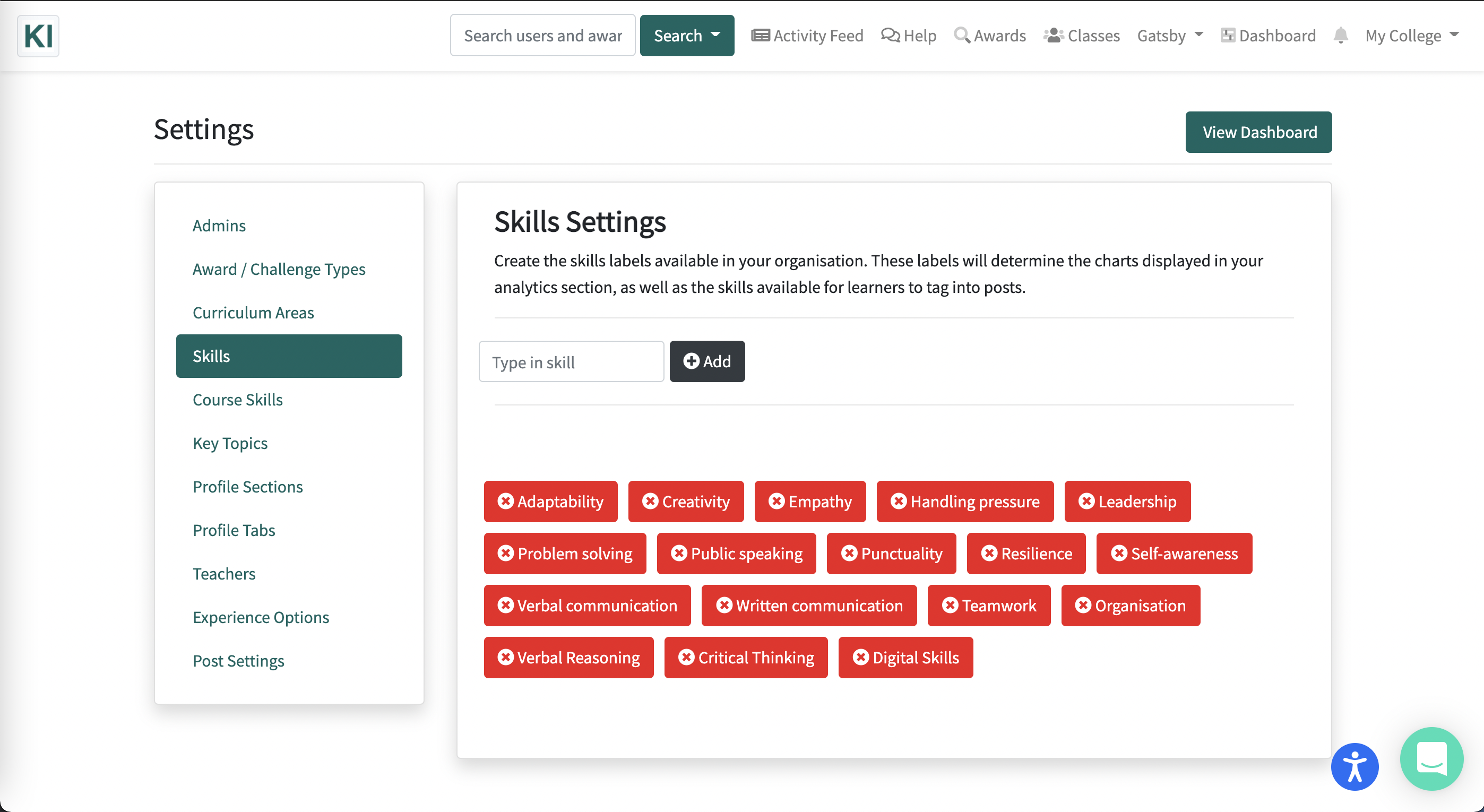
Setting up the vocabulary of your character education framework on Kloodle
This serves two purposes. Firstly, the vocabulary you have just created determines the spokes of a learners’ skills wheels.
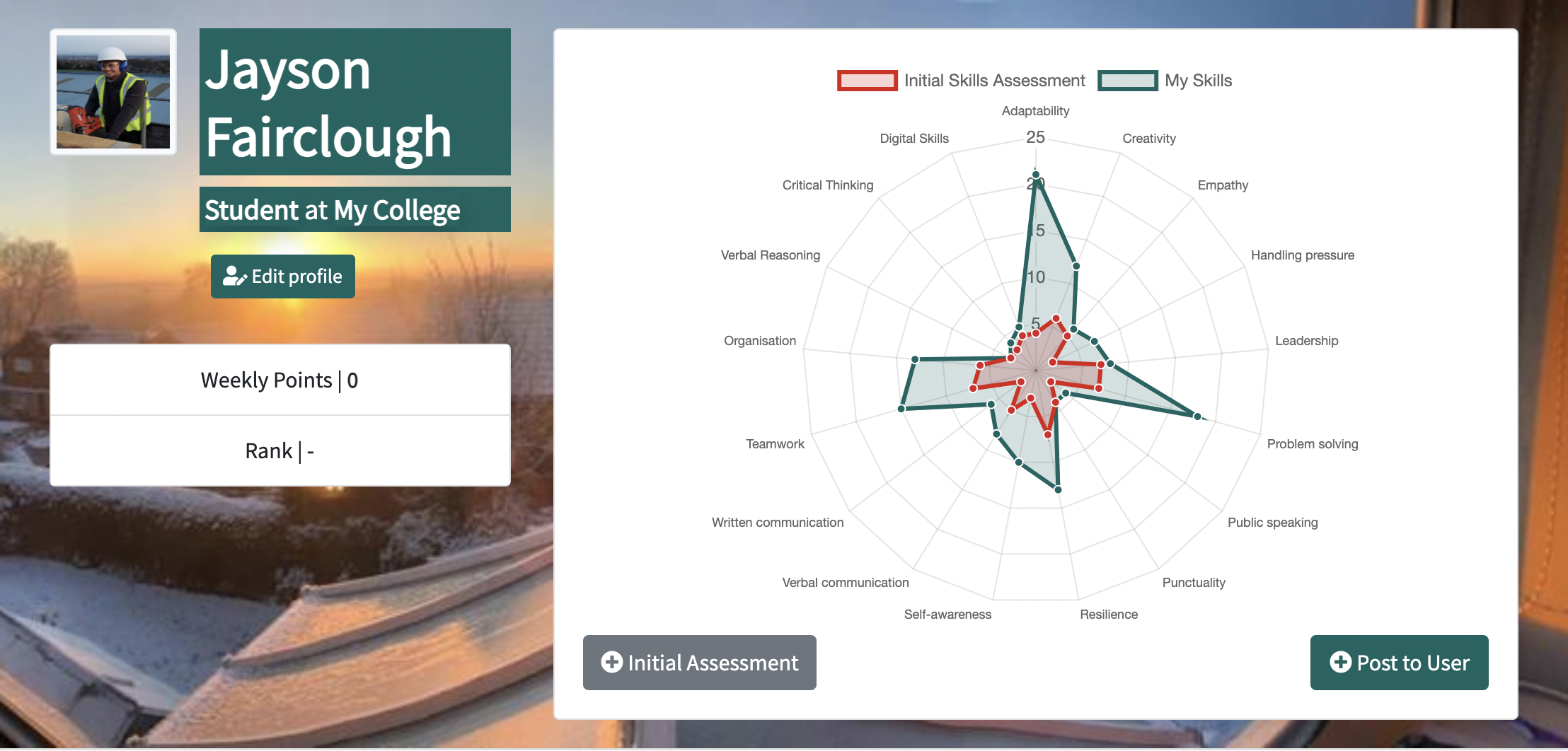
A learner’s skills wheel is a visual representation of the reflections they have created on their profile.
Secondly, this provides the “tag” options for learners to select from when they begin to reflect upon learning. We’ll go into more detail about this later on in the post.
2. Create “Activities” for all of your enrichment opportunities
Perhaps the single greatest indicator as to whether learners are developing character at your school or college is their participation levels in enrichment and extra-curricular activities. In order to see whether this is happening, you’ll want to set up your enrichment activities on Kloodle to capture participation levels.
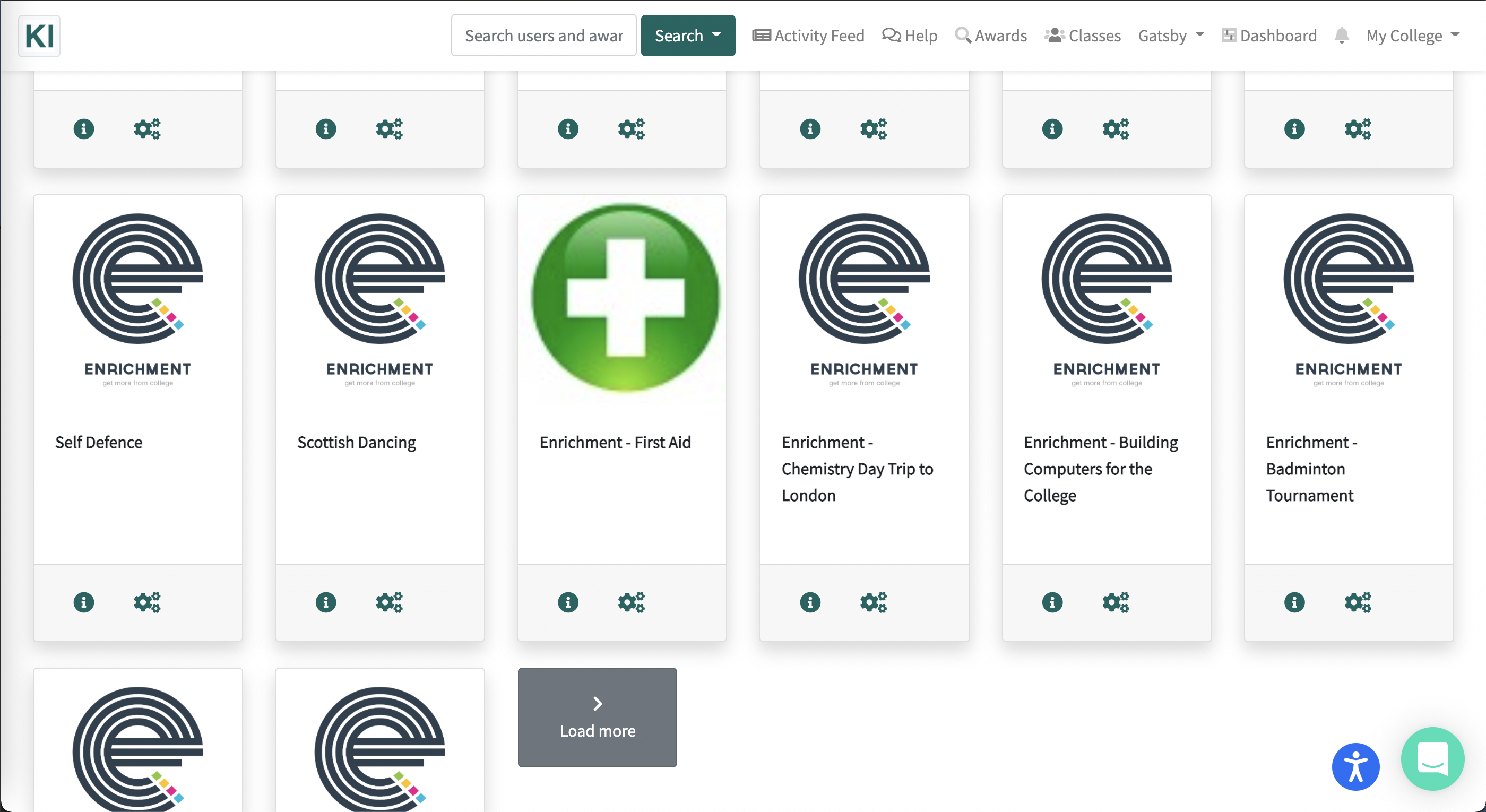
Uploading enrichment activities to Kloodle creates “activities” you can add to learners’ profiles.
Once you have done this, you’ll be able to capture participation levels in your enrichment activities. Learners can then create reflections and upload them to the activity in question, demonstrating how the activity is developing their skills and character.
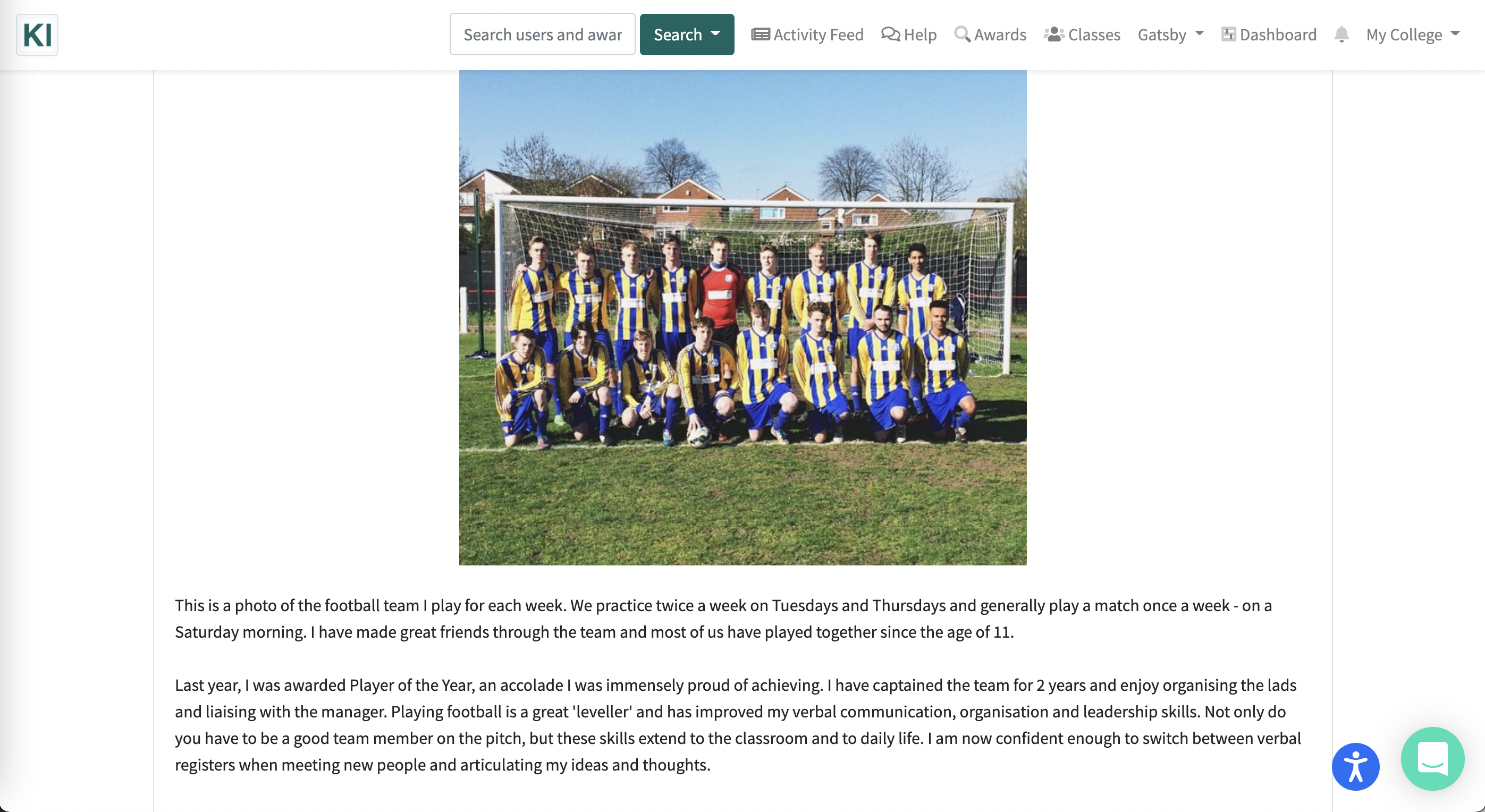
A reflection posted to a learner’s profile demonstrating the teamwork built through playing football.
3. Set up awards for learners to earn
Character traits and skill development is reinforced when it is celebrated.
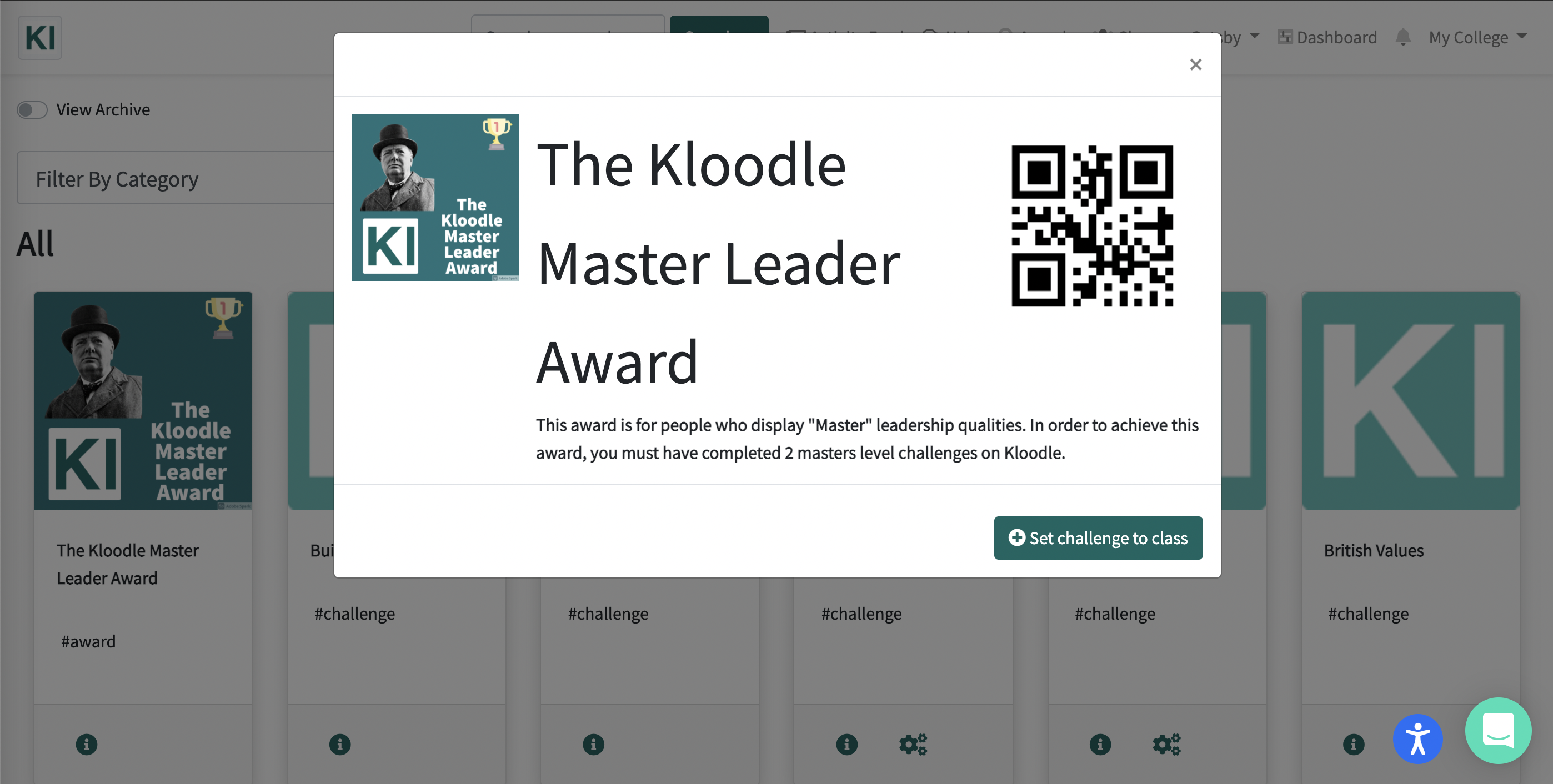
An example of an award Kloodle users can earn on their profile.
Everyone likes to feel their hard work is appreciated. Celebration reinforces the skill or character trait in question in the young person’s mind. It creates immediate feedback. A lot of the time, character and skill development can go “unseen”. As a result, confidence can be low resulting in slower development.This is like comparing the allure of social media vs studying for your exams. “Likes”, page views and comments provide immediate feedback, reinforcing the behaviour of creating new posts. Studying for an exam has delayed reward. This delay results in the behaviour feeling difficult. If we could be rewarded, instantly, for each hour of study we do, the behaviour would likely be far easier. Shortening the feedback cycle closes the “learning loop” and strengthens the learning process. If you can identify positive examples of skill and character development and create immediate feedback mechanisms, like rewards, you’ll instil the importance of character in the minds of your learners, strengthen the link between certain behaviours and the character traits it develops, and increase the appetite to demonstrate more of that behaviour.
You can check out some examples of our awards here.
4. Create challenges to help build skills and character
Character and skills are best developed through ACTION. In order to develop, you need to practice. Kloodle Challenges are a great way to stimulate learners into action. They are a series of activities learners need to complete and EVIDENCE in order to achieve. They can range from displaying a certain soft skill or character trait (like giving a presentation), or a demonstration of a more specific “hard” skill, like writing some HTML code.
In either case, the way to achieve challenges is to submit the supporting evidence to showcase the skills and character traits you have developed. You’ll already be doing numerous activities across your organisation that would make for good exercises. You can see some examples of our available challenges here.
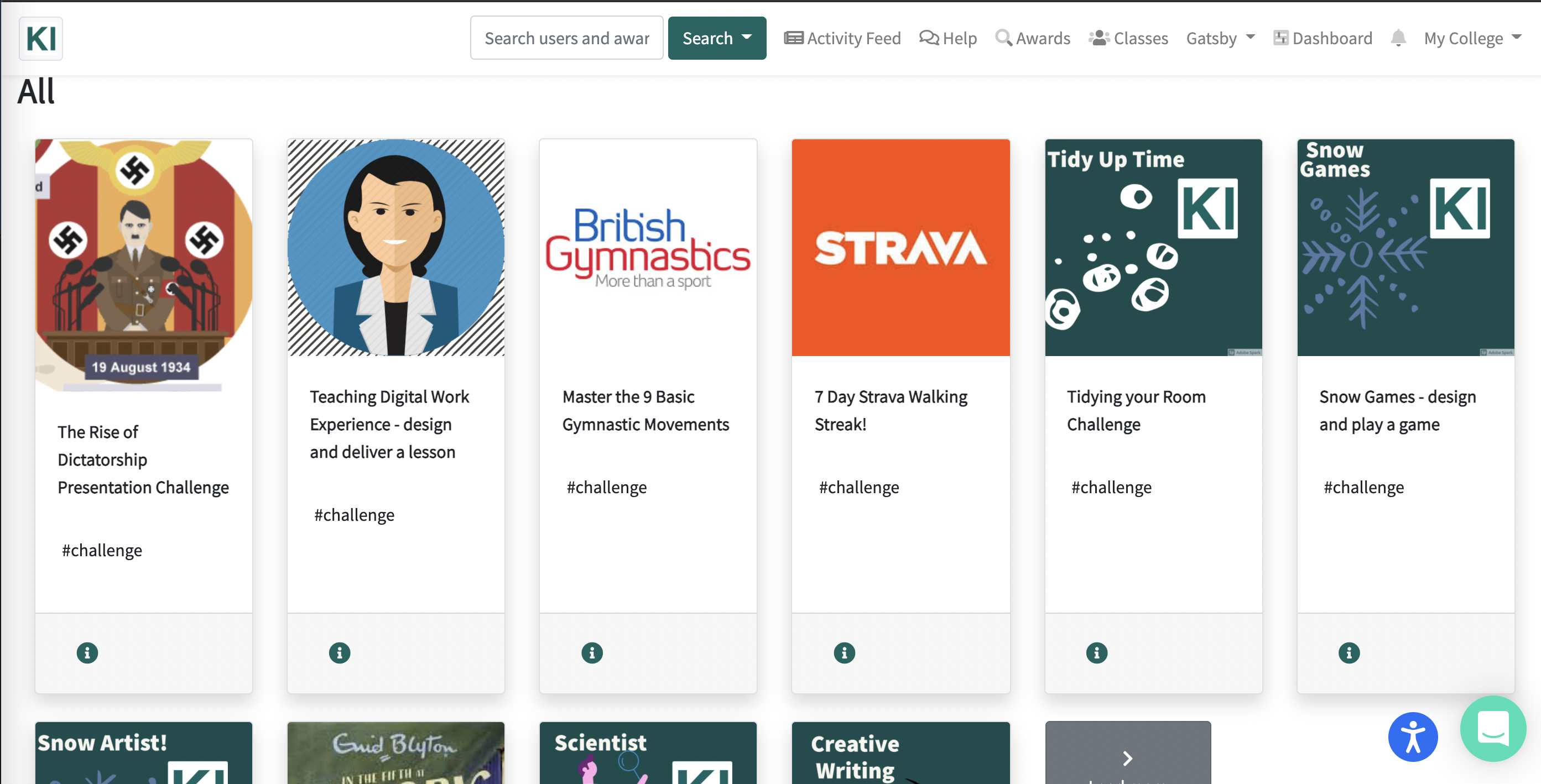
Some example challenges available on Kloodle
5.Commence learner reflections to build their profile
In order for learners to truly develop their skills and character, they must follow a two step process: –
- Awareness – i.e. identify the activities or situations where they are utilising and developing skills and character
- Reflection – thinking about what you did, what went well, what could be improved and what character traits you developed
The first step is what we’re looking to achieve when we’re creating rewards and challenges. We’re building awareness around the situations where young people are building their skills and character. In order to truly understand how they’ve developed, young people need to reflect. Kloodle is a fantastic platform for this process.
On Kloodle, students post reflections to evidence the impact of their activities on skills & character development. This process builds their skills wheel and should be undertaken as frequently as possible. We’ve seen learners upload examples daily.
In order to create a reflection, learners log in to their profile

Log in to your learner profile
They then click “Create post to grow wheel”

Click “Post to Grow Wheel” on your profile
A learner can then begin to create their reflection. This can include media, such as blogs, photos, videos, documents, YouTube or Instagram links. The idea is to go into as much detail as possible. Providing detail increases the quality of reflection and strengthens the link between activity and character.
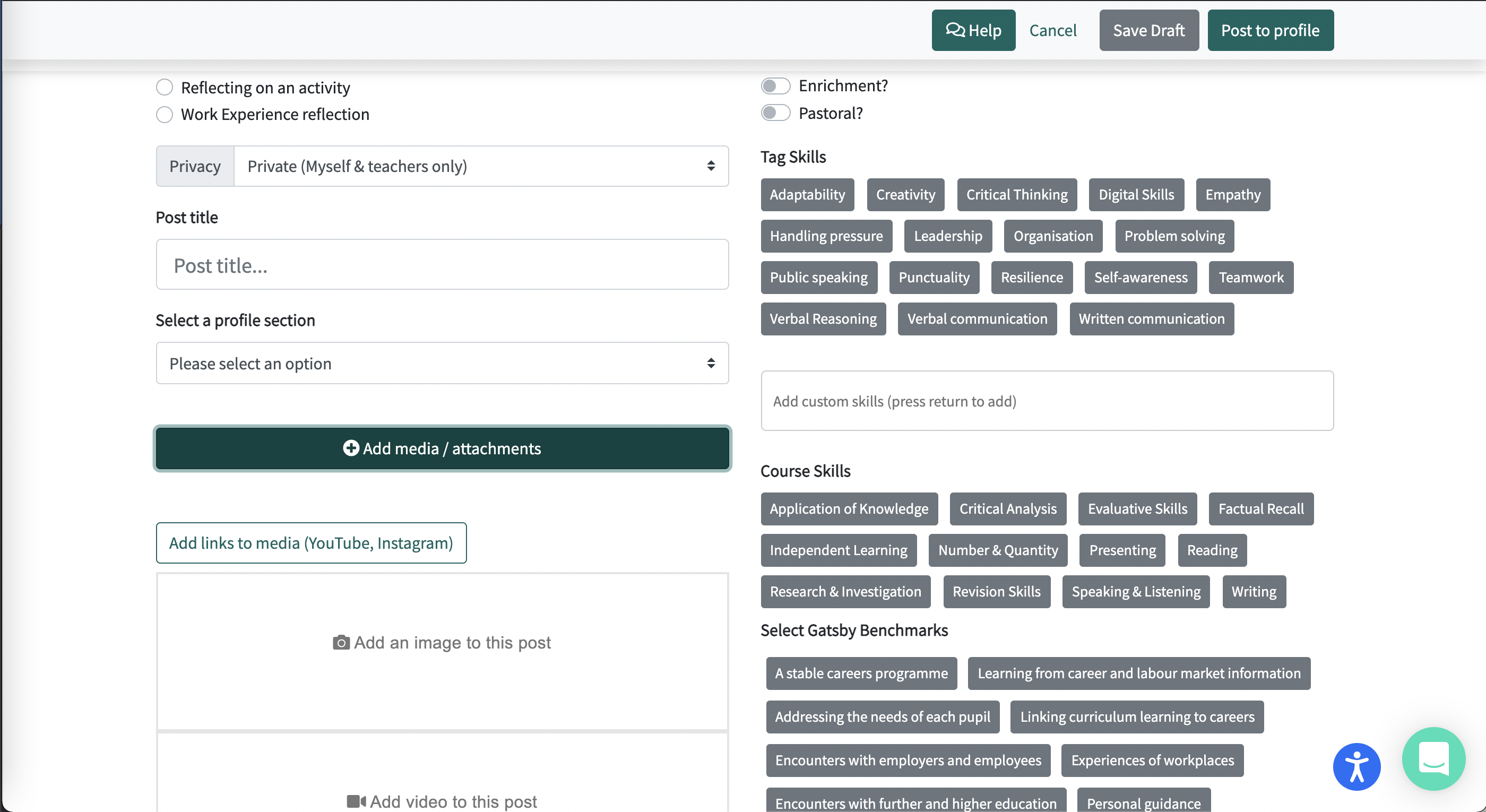
Add media, descriptions to reflect upon your activities. Then TAG IN THE SKILLS!
The next call to action is to always tag in the skills and character traits the post is an example of. In our work with young people, we have found time and again that young people are EXCELLENT at recalling what they do. They are a little less good at identifying the skills and character traits their activities build and demonstrate. This process of tagging REINFORCES these skills and character traits, enabling learners to describe their development with clear vocabulary. This is unfamiliar behaviour to most young people. By making this behaviour more commonplace, learners begin to understand their character development more effectively.
What this process also does very effectively is reinforce the language of your skills, character or values framework.
Remember in step 0, we identified a skills, values or character framework. We then inputted these words into Kloodle. We’re now getting our learners to tag this language consistently into every one of their posts.Rather than being a redundant document on the wall or hidden away on your website, the Kloodle platform is live and constantly active, breathing life into your character education framework. Our learners use the vocabulary daily, developing confidence with the words, relate them to their own activities, living and breathing our framework.
The language of our character education framework needs to be infused into the daily life of the organisation. Every reward, sanction, achievement or activity needs to build upon this language of character.
By posting regularly to Kloodle, your framework comes to life.
6.Monitor impact using the dashboard
Once you have got these processes up and running, you are in a great position to monitor the overall cumulative impact of your skills, character or values approach through the Kloodle dashboard. This feature provides you with a broad overview of the main areas on Kloodle: –
- Profile completion
- Which groups are displaying skills, character and values
- Who’s participating in enrichment
- Who is doing work experience
- Who has hit the Gatsby Benchmarks
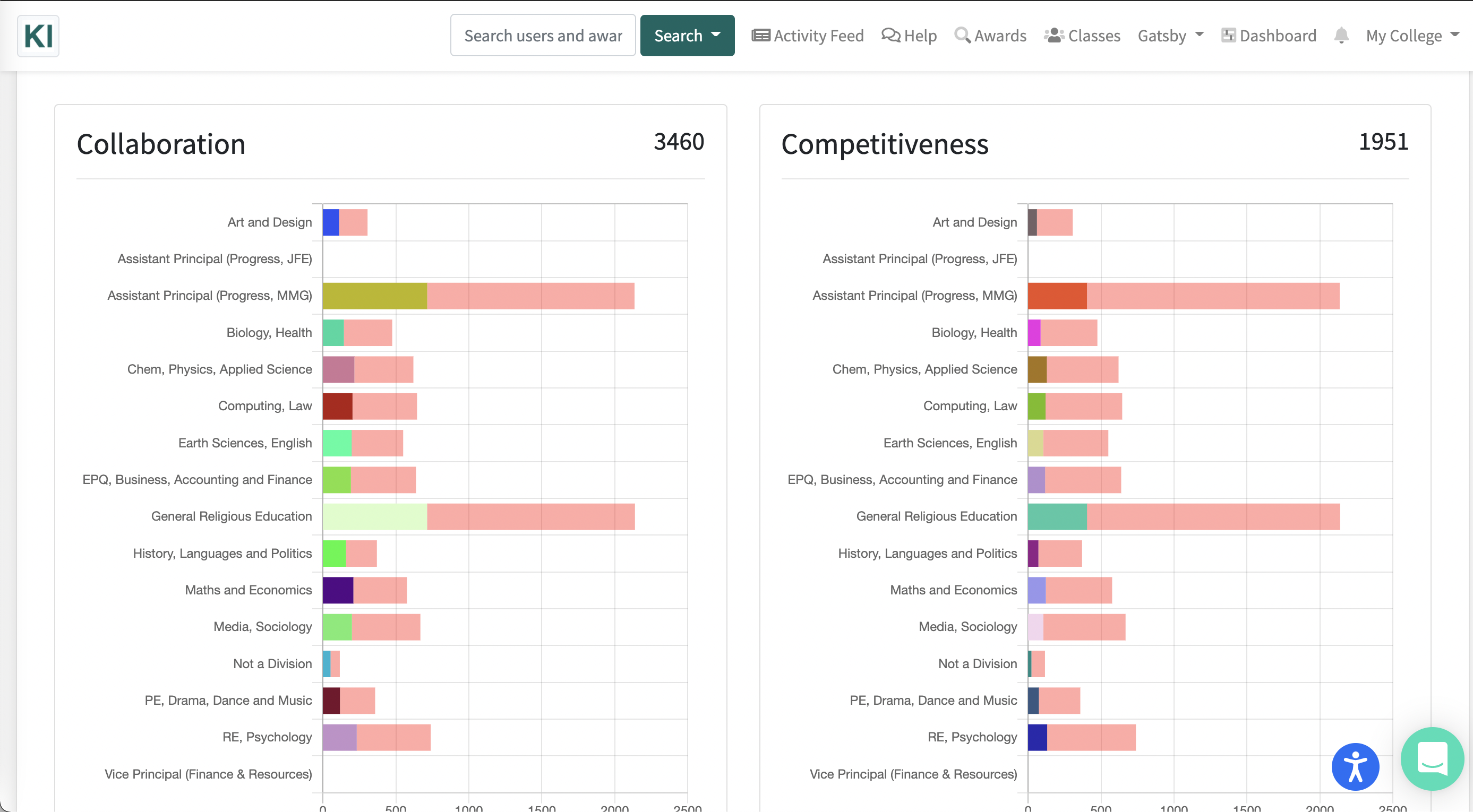
A screenshot of a typical Kloodle dashboard, demonstrating the number of skill reflections each of our areas has posted.
The main dashboard provides you an overview of how learners are developing in these areas as cohorts, for example, how each of our year groups are performing. For example, we can see how many Year 7 students have displayed resilience, participated in enrichment or attended a Gatsby-related event, for example.
You can drill down to the individual level also, and see which individuals in our class have demonstrated these skills, as well as the examples they’ve created.
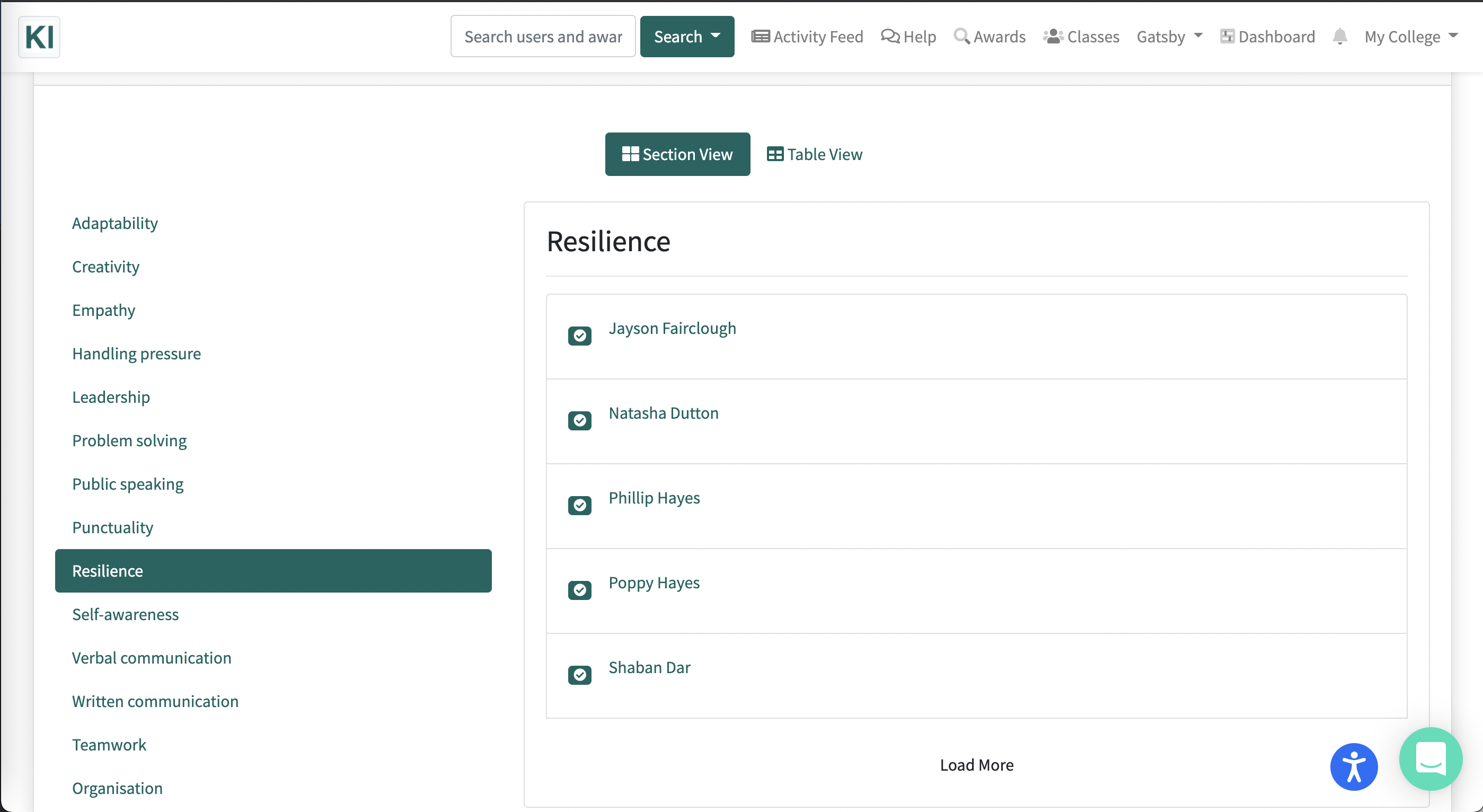
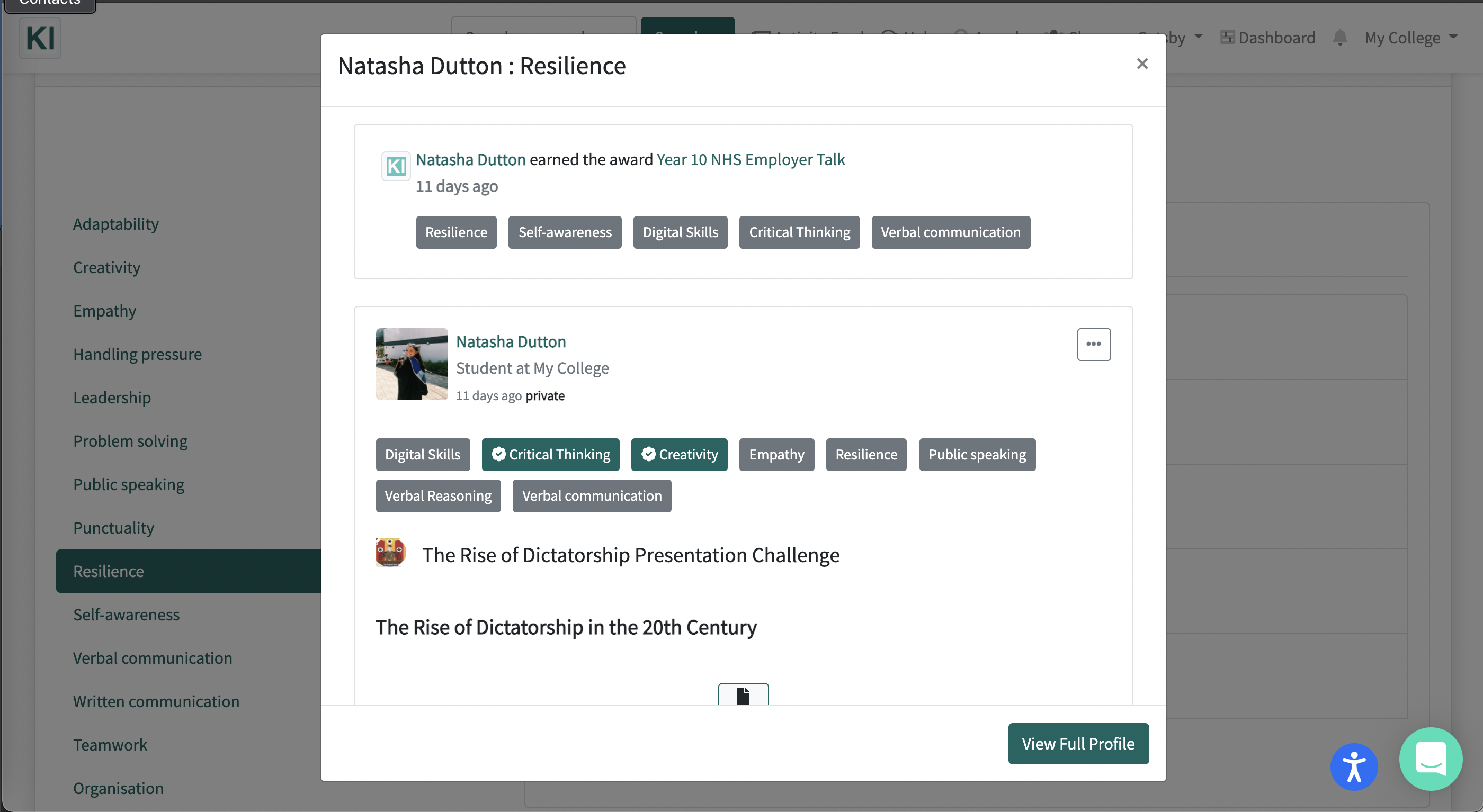
We can begin to see how our character, skills or values based approach is reinforcing our learners’ development. We also can see how we’re building a bank of evidence to illustrate impact. It’s win-win.
Conclusion
In conclusion, Kloodle is a fantastic way to embed and reinforce or skills, character or values curriculum. By using Kloodle we can: –
- Capture all instances where skills, character and values are being developed
- Embed the language of skills, character and values throughout our organisation
- Supercharge our learners’ understanding of this vocabulary and their development
- Create a rich body of evidence to showcase the impact of our skills, character or values curriculum culture
